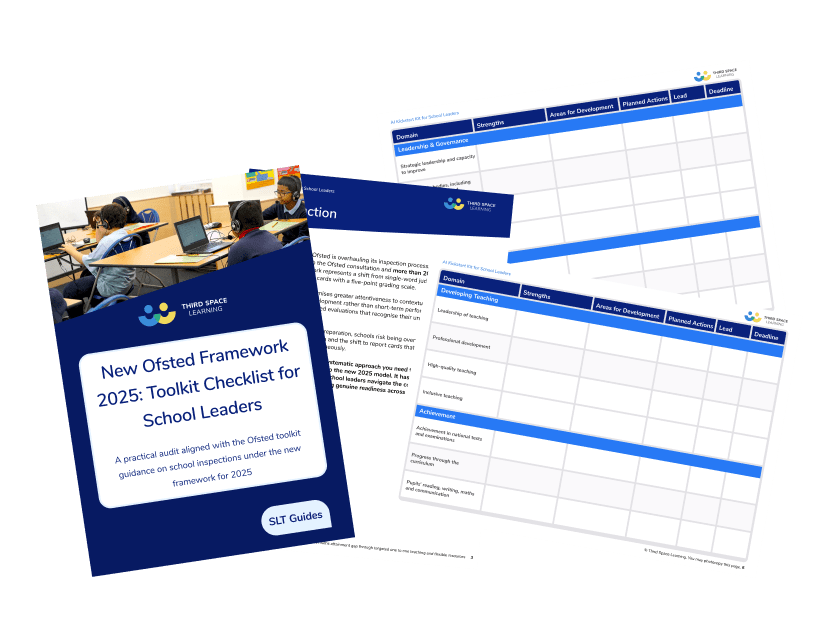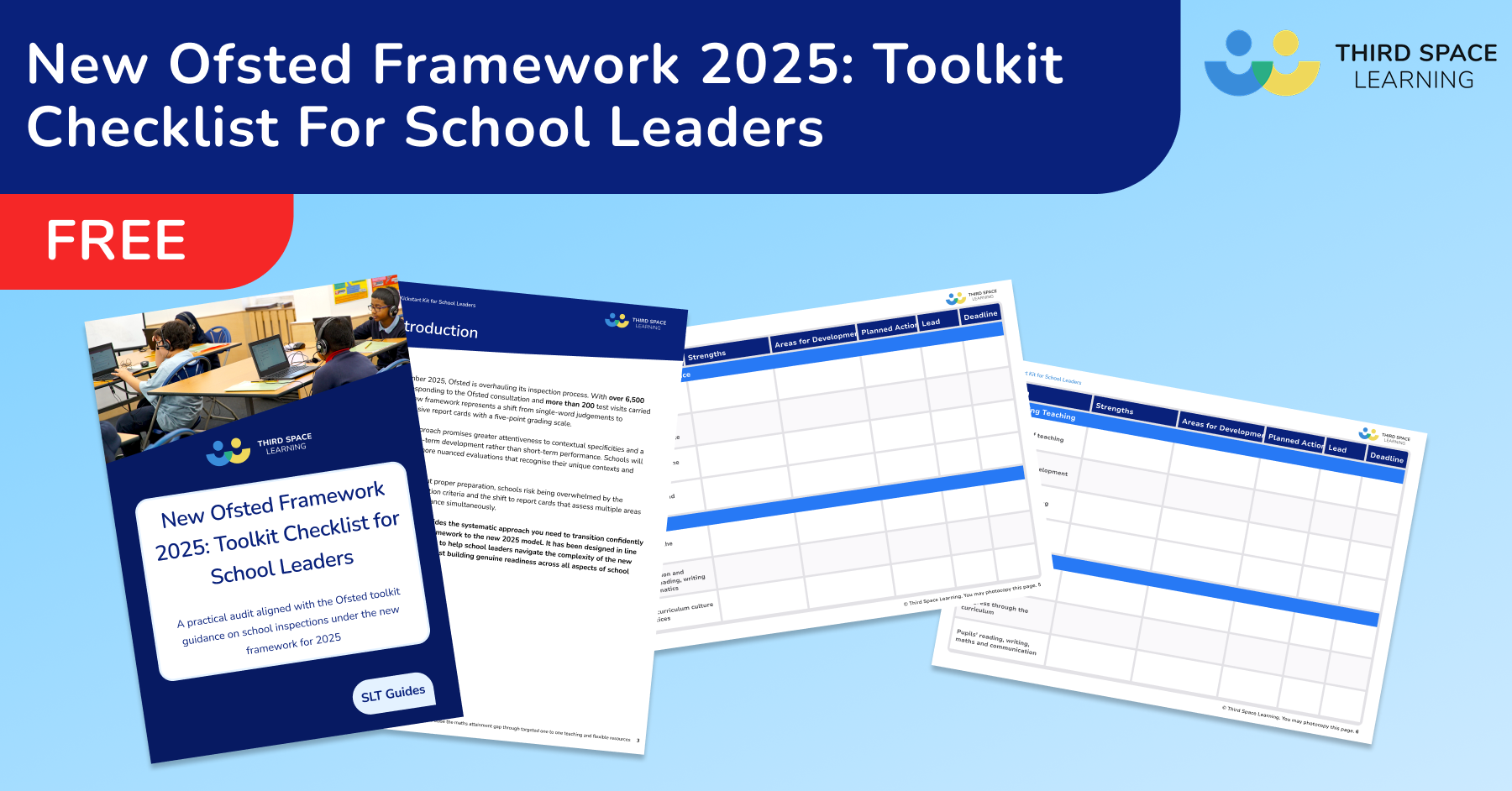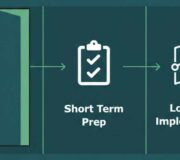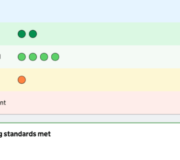Key Insights into the New Ofsted Framework 2025: What School Leaders Need to Know
Six years since the 2019 framework, there’s a new Ofsted framework for 2025. In early 2025, Ofsted began a consultation period, called the ‘Big Listen’, to help inform changes to the way they inspect schools, Initial Teacher Education (ITE) and children’s social care. Now this consultation period has concluded, Ofsted has confirmed significant changes to the inspection process from November, aiming to provide a more nuanced evaluation of education providers.
This blog details the updates for the new inspection process and report cards that rolled out on 10 November 2025 for all education providers, including mainstream schools, state-funded schools, independent schools, special educational schools and FE and skills providers, who will be subject to the new inspection model.
Routine inspections
School inspections have been suspended and resumed, under the new framework:
- 10 November 2025: for early years, state-funded schools, and FE and skills inspections
- January 2026: for initial teacher education (ITE) and non-association independent school inspections
Between 10 November and Christmas, Ofsted prioritised state-funded schools that have volunteered for inspection under the new system.
You can find more information under ‘Next steps’ in the ‘Starting inspections’ section of Ofsted’s consultation outcome.
Background of the 2025 framework
Ofsted has updated the 2019 inspection framework. They carried out a ‘Big Listen’ consultation period and gathered feedback from education providers, parents and carers, and other stakeholders over 12 weeks. Ofsted then used this feedback to inform the new 2025 inspection framework.
Ofsted noted that parents and carers valued separate judgements for each inspection area as their most favourable change to the previous Ofsted inspection framework, while professionals wanted bullet point summaries of the findings. The new Ofsted report cards aim to merge these two preferences.
The new inspection framework addresses concerns around the previous inspection model, including the use of ungraded inspections and the impact on school leaders and educators. As such, all inspections of state-funded schools will be ‘full’ inspections with report cards, and the aim to simplify the process and allow schools to know exactly what to expect.
Additionally, the focus of inspections will evolve to place less emphasis on attainment data and compliance, and more on teaching quality, staff wellbeing, and pupil support. There is increased focus on the wellbeing of leaders and staff, with measures such as additional inspectors and mental health training for inspectors.
New Ofsted Framework 2025: Toolkit Checklist
A practical audit aligned with the Ofsted toolkit guidance on school inspections under the new framework for 2025. Includes an actionable checklist.
Download Free Now!Considering the context
In the renewed framework, Ofsted intends to provide a more accurate picture of the school and the local area, taking into account contextual data and the unique challenges faced by each educational setting. Ofsted inspectors will work closely with education providers to understand their context and identify areas for improvement.
School context
Considerations for the school’s context include:
- The characteristics of learners,
- Outcomes, including performance data for groups of children,
- Attendance data.
Local context
The new Ofsted framework intends to assess schools within their local context, acknowledging socio-economic factors that may impact performance.
Local data that Ofsted use, and will make available to parents and other stakeholders, will include:
- Deprivation and relevant characteristics of the local community,
- Availability and quality of other educational and care provision in the area,
- Any provision or service a learner may move on to next.
Toolkit introduction
Introducing a ‘toolkit’ aims to give leaders and governors an accurate understanding of their school’s strengths and areas of improvement, while claiming not to introduce excessive paperwork.
This toolkit starts the conversation with Ofsted inspectors. Ofsted aims for school leaders, senior management and those responsible for governance to all have a clear, shared understanding of how they are performing, and what they need to do to improve their provision for learners.
Ofsted’s renewed inspection framework also recognises the importance of inclusive education and the need to support vulnerable children and disadvantaged pupils. Ofsted inspections aim to focus on ‘getting it right for all children and learners’, identifying the need to focus on the experiences and outcomes of disadvantaged children and learners.
Essentially, they believe that if providers are supporting the disadvantaged children and students, they are also supporting the non-disadvantaged students.
There is also a desire for the reports to answer the question “What is it like to be a child or learner in this provider?’
Ofsted inspection framework methodology
The new inspection methodology focuses on a more collaborative approach, with inspectors working closely with school leaders and educators to understand the school’s context and identify areas for improvement.
Ofsted’s new inspection process includes a pre-inspection phone call or video conversation to discuss the school’s context and agree on the focus areas for the inspection. This conversation is also designed to build productive relationships.
The new Ofsted toolkit is intended to allow leaders and governors to self-identify the areas of strength and development in their school. If leaders have already identified their areas of development, it should come as no surprise during an inspection. Ofsted’s toolkit guides the evaluation, but it will not be used as a checklist.
Ofsted has also stated in their changes that they will not return to formal lesson observations of teaching practices (including graded lesson observations) that were removed in previous revisions of Ofsted inspections.
While there is not yet any official guidance on how Ofsted will inspect the use of AI, there are some clear themes schools can infer.
No deep dives
School inspections no longer use the deep-dive methodology as inspectors found it challenging to gather their findings and evidence this way during the inspection. Instead of deep dives, inspectors work with leaders to agree on areas of focus, which will typically mirror school leaders’ improvement priorities.
Evaluation and grading
Replacing the single-word Ofsted grade descriptors of the old system is a report card, which evaluates a school’s performance across 11 evaluation areas.
Replacing the single-word Ofsted grade descriptors of the old system is a report card, which evaluates a school’s performance across 11 evaluation areas.
Report cards eliminate the overall effectiveness grade used in the Ofsted rating system for educational settings entirely. Instead, Ofsted report cards use a grading system.
The new report cards will provide more detail about schools’ performance and include a 5-point scale from exceptional to urgent improvement, where specific areas, such as curriculum, safeguarding, and developing teaching, are graded and evaluated individually.
Since the consultation period, the grades have been renamed:
- Exceptional
- Strong standard
- Expected standard
- Needs attention
- Urgent improvement
School inspection areas
Ofsted’s new evaluation areas will assess components of high-quality education provision, including teaching quality and student wellbeing. Each evaluation area will receive an individual grading, or overall effectiveness grade, and a written evaluation.
The new report cards may cover up to 11 categories depending on the institution’s offerings. Ofsted’s 11 distinct evaluation areas for all mainstream state-funded schools and independent schools are:
- safeguarding
- inclusion
- curriculum and teaching
- achievement
- attendance and behaviour
- personal development and well-being
- leadership and governance
- early years settings in schools (where applicable)
- sixth form provisions in schools (where applicable)
All school inspections start by discussing and observing the school’s work against the criteria in the ‘secure’ column for these evaluation areas before exploring other columns.
Interestingly, inspectors consider the school’s approach to children’s welfare, including establishing routines and promoting well-being.
Inspectors also evaluate the school’s inclusive practices for supporting disadvantaged pupils and vulnerable children. This includes a focus on pupils from disadvantaged backgrounds and pupils with SEND.
Thanks to grading and written reports of each evaluation area, leaders and parents will have a clear picture of the strengths and areas of improvement for the school.
Ofsted has stated that they want to work collaboratively with schools on these grading areas:
“We will go about our work with professionalism, empathy, courtesy and respect. Our inspections must feel ‘done with’, not ‘done to’.”
As part of this focus on collaboration, Ofsted also prioritises mental health and well-being, recognising the importance of these factors in education settings.
Safeguarding evaluation
Safeguarding will be assessed on a binary scale: ‘Met’ or ‘Not Met,’ reflecting its critical importance. Schools either meet statutory requirements and instil an open and positive safeguarding culture or they do not, Ofsted safeguarding evaluations reflect this.
A “not met” judgment in safeguarding will automatically categorise the school as a “category of concern.”
Types of inspections
The new framework introduces two types of inspections:
- Graded inspections
- Monitoring inspections.
Removal of ungraded inspections
From November 2025, Ofsted no longer conducts ungraded inspections. The removal of ungraded inspections aims to streamline the inspection process and reduce stress for educators. However, the transition to full graded inspections may increase the pressure and workload for leaders and staff.
Graded inspections
All routine inspections will be full, graded inspections occurring on a four-year cycle. Graded inspections (previously section 5 inspections) evaluate the school’s performance across all evaluation areas, while monitoring inspections will focus on specific areas of concern.
Monitoring inspections
Regular monitoring inspections provide targeted support and guidance to schools causing concern.
If a school is deemed below an acceptable standard of education and/or the leadership does not have the capacity to improve, it will be subject to monitoring inspections.
Any school that has one or more evaluation areas graded as attention needed or causing concern will have monitoring visits.
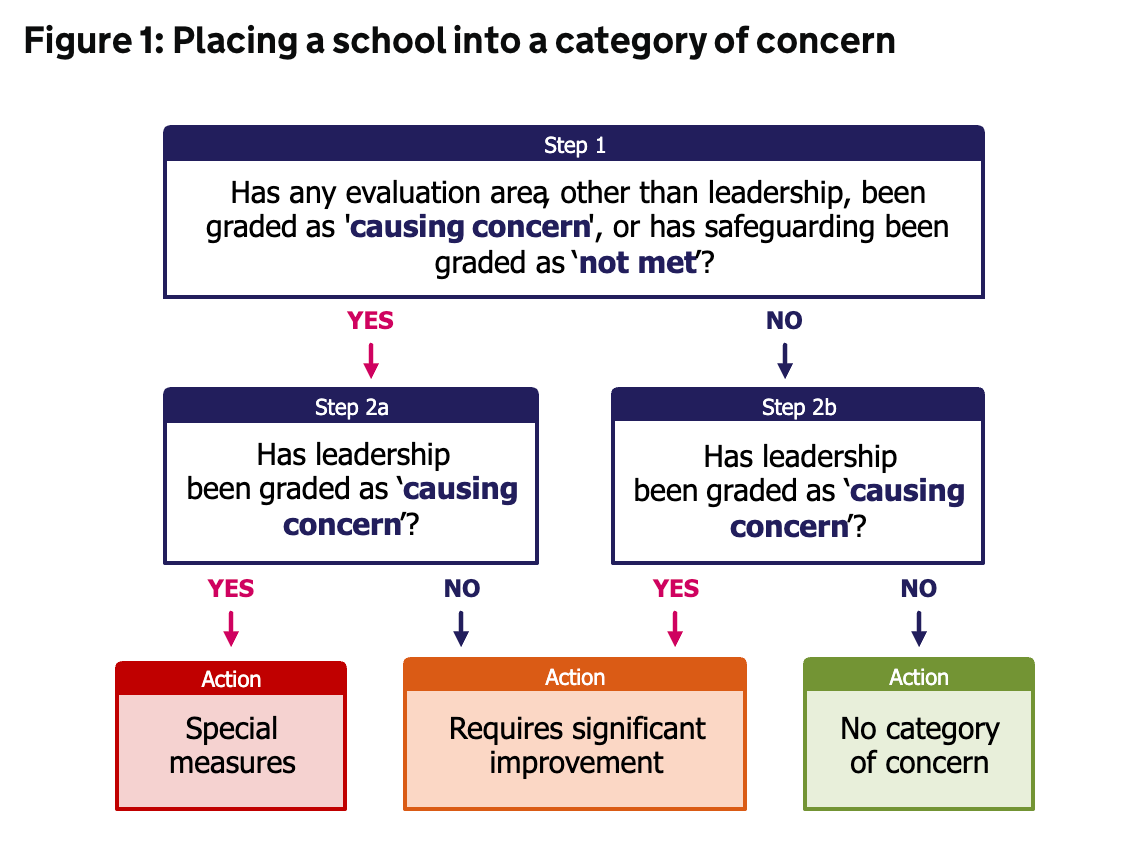
Inspection teams focus on the areas that require improvement from the previous inspection.
If a struggling school requires significant improvements, it will have 5 monitoring meetings over 18 months. For schools that require special measures, there will be 6 monitoring inspections within 24 months. If, after the set number of monitoring inspections, there are still concerns, then Ofsted will conduct a full reinspection.
Who the new Ofsted guidance applies to
The new framework applies to all education settings, including mainstream schools, state-funded schools, independent schools, and FE and skills providers.
Ofsted inspects registered early years settings, maintained schools, academies, and further education and skills provision in England.
Early Years settings are subject to the new inspection model, with a focus on evaluating the quality of education and care provided to young children. Early Years inspections focus on:
- leadership and governance
- curriculum
- developing teaching
- achievement
- behaviour, attitudes and establishing routines
- children’s welfare and well-being
- inclusion
- safeguarding
Ofsted will work closely with each individual education provider to support their improvement and provide targeted guidance and support.
Implementation and support
The new Ofsted report cards and 2025 framework apply to schools from November 2025, ITEs from January 2026 and children’s services and social care in 2026.
Ofsted will provide education providers with detailed inspection toolkits outlining the standards and criteria for each assessment area.
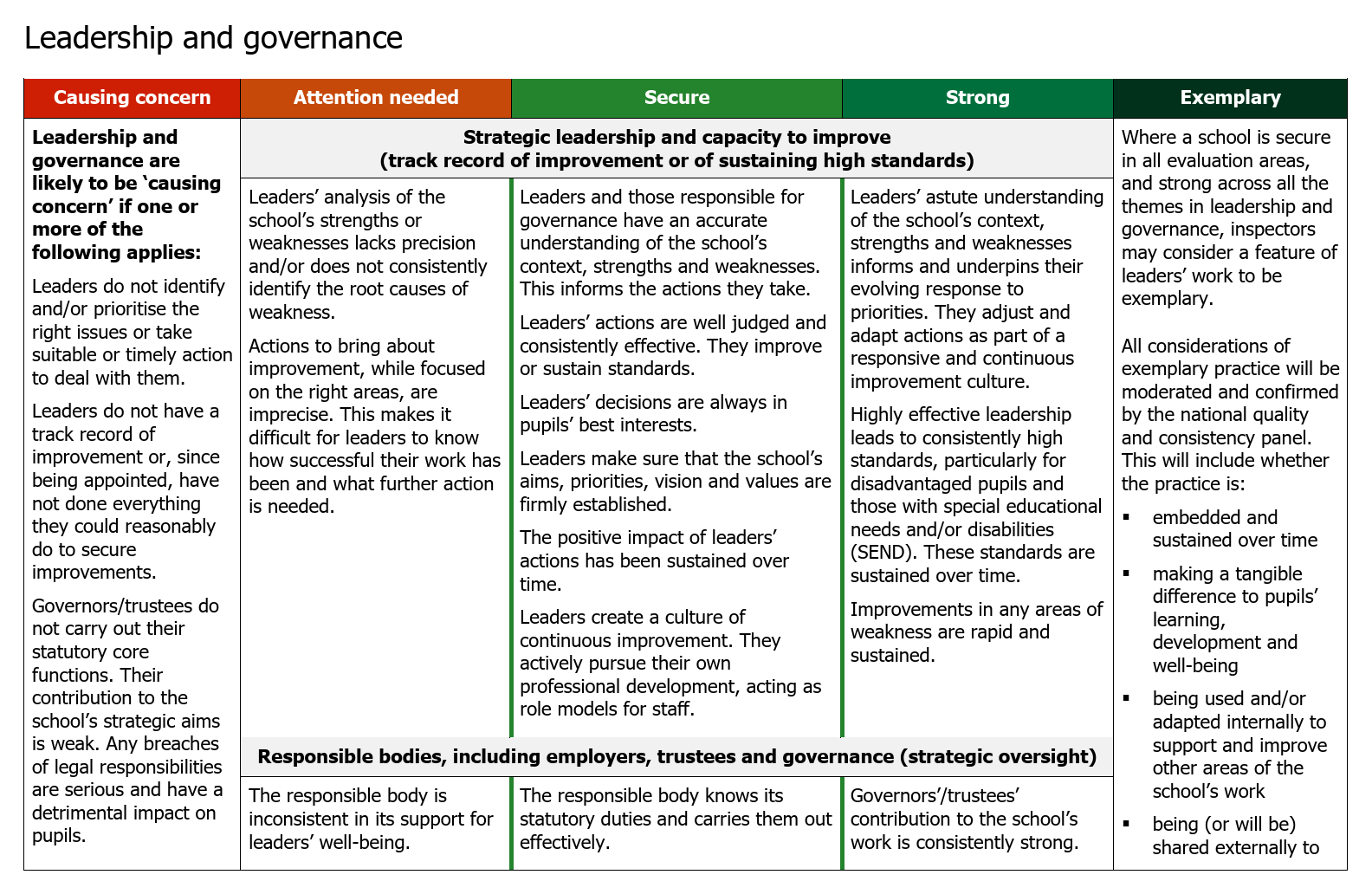
Additionally, Ofsted have shared its Ofsted Academy, which contains exemplary case studies and Ofsted inspector training for all to access. New training for inspectors will ensure that they are equipped to deliver the new Ofsted framework, including using the new toolkit.
Education providers can provide feedback on the proposed reforms of the inspection process and suggest areas for improvement.

Key takeaways from the new Ofsted inspection framework
- The main Ofsted changes for 2025 include detailed report cards and a revised evaluation system.
- From November 2025, Ofsted will implement its new framework with a consultation period and focus groups used to gather feedback and refine the inspection model.
- School leaders and educators will have access to an inspection welfare, support, and guidance hub, which will provide information and support during the inspection process.
- The operating guide for inspectors includes a new code of conduct which emphasises well-being and transparent, evidence-led evaluations during Ofsted inspections.
- Monitoring visits will replace ungraded inspections for struggling schools causing concern.
New Ofsted framework FAQs
From November 2025, all inspections are ‘full’ inspections. Ofsted will no longer carry out ungraded inspections. This aims to simplify Ofsted inspections, so every school will know what kind of inspection it will be and how often. Ofsted is also changing its monitoring programmes for state-funded schools.
Ofsted has removed its ‘single-word’ or ‘one word’ judgements. Schools undergoing ‘graded’ inspections will now receive a report card and judgement for up to 11 areas.
Ofsted now uses a new five-point scale, ranging from “exceptional” at the highest end, to “strong standard”, “expected standard”, “needs attention”, and “urgent improvement” at the lowest end.
DO YOU HAVE STUDENTS WHO NEED MORE SUPPORT IN MATHS?
Skye – our AI maths tutor built by teachers – gives students personalised one-to-one lessons that address learning gaps and build confidence.
Since 2013 we’ve taught over 2 million hours of maths lessons to more than 170,000 students to help them become fluent, able mathematicians.
Explore our AI maths tutoring or find out about school tutors for your school.
